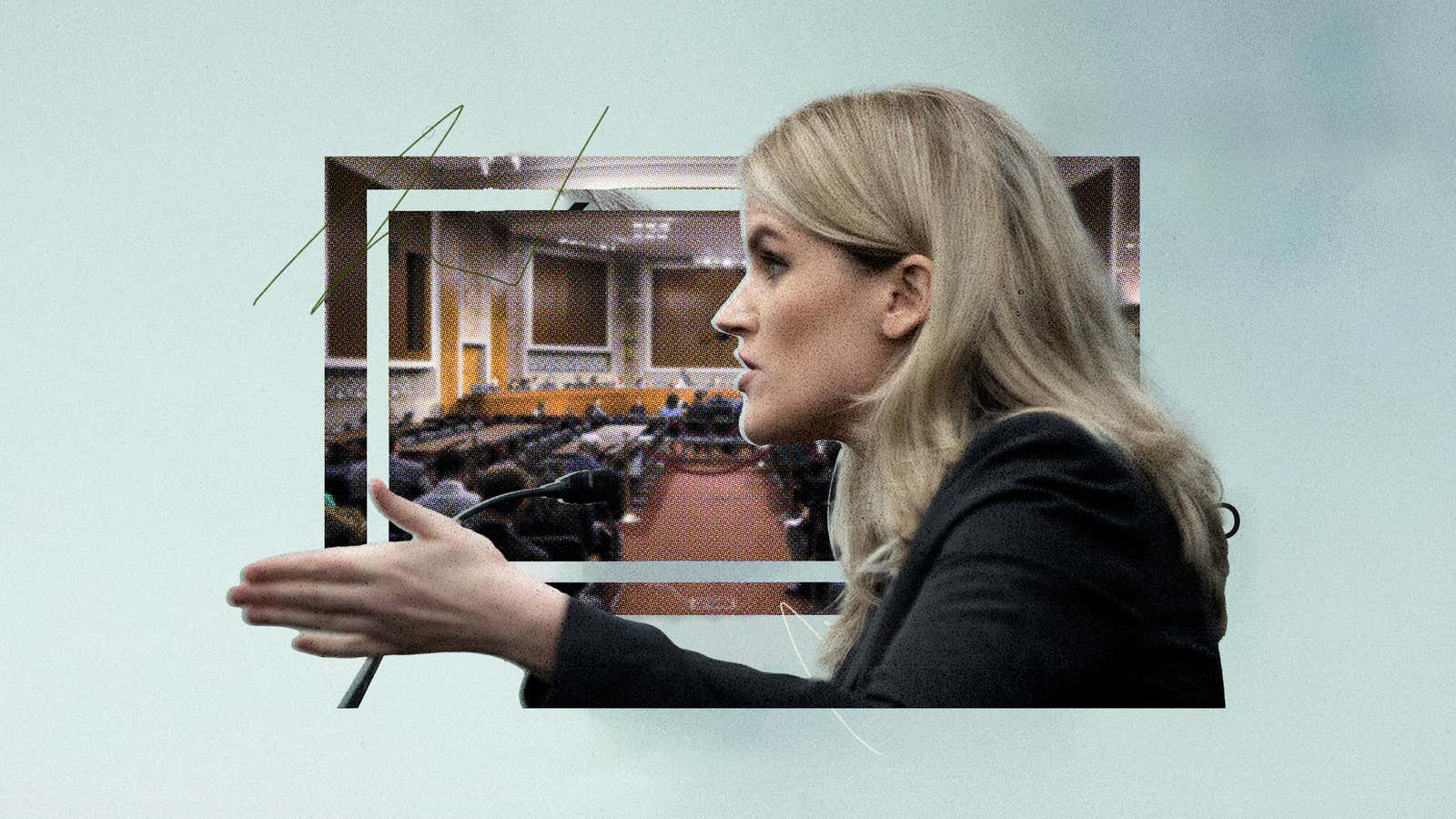Hello, Quartz at Work readers!
The internet’s been chattering—or, rather, unspooling—about Threads, Meta’s lookalike Twitter competitor that launched last week. But while Meta moves to dominate another corner of the digital public square, it’s worth listening to one of the company’s chief critics: whistleblower Frances Haugen.
A former product manager on Facebook’s civic integrity team, Haugen became a global figure after she released a trove of damning documents—some 22,000 in total—that exposed how the social media company knew its algorithms rewarded extremism and chose to obscure it.
Now with a new memoir, Haugen grapples with the weight of her words. But her story, Quartz’s Gabriela Riccardi writes, presents more than a personal narrative. It’s also a revealing look at what it takes to confront wrongdoing in your work.
“I shy away from the idea that I was exceptional,” Haugen tells Riccardi in a discussion about reporting what she witnessed at her former employer. “I think it’s more that I had a series of life experiences I knew that I could come back from.”
In her telling, it’s a string of small moments that prepared Haugen to come forward with what she witnessed at Facebook. There’s the childhood loss that pushed her to find purpose in her teens. Later, a life-defining illness leaves her hospital-bound and paralyzed. Years from then, family dinners in Iowa pushed her to take what was inside Facebook’s algorithms public. Haugen’s story is one of recalibration: of calculating, then recalculating, your own sense of risk in service of something larger than yourself.
In Quartz, Haugen explains how she came to pick conviction over the company line—and why she isn’t giving up on Facebook.
UPS WORKERS ARE ALL FIRED UP
Practice protest (n.): A short-term demonstration when a labor strike is imminent—or workers’ warning shot when contract negotiations get confrontational.
🪧 That’s the tactic United Parcel Service workers are turning to as their bargaining with company management enters a deadlock. UPS employees in California began picketing late last week, Quartz’s Ananya Bhattacharya reports, despite the fact that a formal strike hasn’t started yet.
If a resolution isn’t reached by July 31, an all-out work stoppage is on the horizon—and it looks to be the largest single-employer strike in US history, with some 340,000 workers walking out. Here’s what’s on the bargaining table.
WHILE AI USERS HAVE LEFT THE CHAT

When OpenAI’s ChatGPT debuted to the public last November, users were quick to experiment with ways it could help them in their work. (Companies have tested it, too, with varying degrees of success.)
But new data suggests the novelty might be wearing off. Last month, the AI-powered chatbot’s global usership fell nearly 10%—the first-ever traffic drop recorded for the chatbot.
For OpenAI, ChatGPT’s popularity also comes at a surprisingly high cost. Reporter Michelle Cheng spells out why.
INVITATION TO INNOVATION
“Far too often, employees feel like innovation is off-limits,” writes Simone Ahuja, founder of global strategy firm Blood Orange. But when it seems like big, out-of-the-box ideas are relegated to the top bosses, your team misses out on a lot of creative thinking—and you miss out on the chance to pitch your lightbulb moment.
💡 So how can teams open up the floor? Ahuja suggests “micro-cultures” of innovation, or bringing everyone into big-thinking moments in small ways to start. Try setting aside 10 minutes at the start of your next regular meeting to ask, “What makes you think, ‘Why do we do it that way?’” The answers may surprise you.
YOUR WEEKLY WORK HACK
Four key questions can help you read a severance agreement. If you’ve lost your job in a layoff, emotions are likely running high. But before you sign any paperwork, bring yourself back to ground and know what the stakes are in your parting contracts.
📝 Employment lawyer and whistleblowing expert Stephen Kohn offers a four-step guide on what to look for in severance agreements, plus how to make sure you’re legally protected. Here’s the not-so-fine print: Companies can’t get you to settle away your rights.
QUARTZ AT WORK’S TOP STORIES
👀 America’s first law regulating AI bias in hiring is here
🤖 The economic case for slowing down AI
🤝 This 90-minute exercise helps improve cross-team collaboration
🌍 Microsoft started a new round of layoffs in the US and abroad
🗣 How to get people to actually speak up in meetings
YOU GOT THE MEMO
Send questions, comments, and personal protests to aoakes@qz.com. This edition of The Memo was produced by Gabriela Riccardi.
